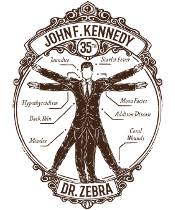

Health and Medical History of President
Zachary TaylorLived 1784-1850
Health and Medical History of President
Zachary TaylorLived 1784-1850
1776-1783
1812-1815
1846-1848
1861-1865
1898-1899
1917-1918
1941-1945
1950-1953
1964-1975
1990-1991
2001-2021

Comment: Dr. Zebra is unsatisfied with these accounts of Taylor's visual problems. It would be nicer to have a single pathological explanation for the two problems noted. Could it be amblyopia?
Some details of those days are available MORE, but the cause of Taylor's death will probably never be known with certainty. Typhoid fever has been proposed, with suspicion directed at the cherries Taylor ate on the 4th 2a.
Comment: A casual look at Zachary Taylor's health history shows that he was pretty well beaten up, medically, by the summer of 1850. Furthermore, during the 1800s Washington, DC was a very unhealthy place to be during the summer. Thus, it would have been easy enough for Mother Nature to carry off Zachary Taylor without help from a poisoner. The burden of proof remains with those who suggest Taylor's end was not natural.
- Little is known about Taylor's childhoood health 1h.
- Taylor did not drink alcohol 1d, which seems odd for someone with the nickname "Old Rough and Ready."
- Taylor was the second cousin of James Madison 4a.
- Bumgarner, John R. The Health of the Presidents: The 41 United States Presidents Through 1993 from a Physician's Point of View. Jefferson, NC: MacFarland & Company, 1994.
 a p.75 - He was right. b pp.72-73 c p.73, citing Marx, who, in turn, never provides references d p.73 e pp.73-74 f p.74 g p.75 h p.72
a p.75 - He was right. b pp.72-73 c p.73, citing Marx, who, in turn, never provides references d p.73 e pp.73-74 f p.74 g p.75 h p.72Comment: Devotes one chapter to each President, through Clinton. Written for the layperson, well-referenced, with areas of speculation clearly identified, Dr. Zebra depends heavily on this book. Dr. Bumgarner survived the Bataan Death March and has written an unforgettable book casting a physician's eye on that experience.
- MacMahon, Edward B. and Curry, Leonard. Medical Cover-Ups in the White House. Washington, DC: Farragut, 1987.
 a p.18
a p.18 - Parenti, Michael. History as Mystery. San Francisco: City Lights Books, 1999.
Comment: Pages 209-240 discuss Taylor's demise and the 1991 testing for toxic substances. Dr. Zebra has not read this book. Apparently, however, Parenti criticizes the arsenic testing performed on Taylor's hair because the arsenic concentration was reported as an average over the entire hair shaft. This would indeed tend to underestimate the arsenic concentration if Taylor had been poisoned, because if Taylor had been poisoned, arsenic would have been deposited only in the part of the hair that grew between the time of the poisoning and death -- supposedly just a few days. Thus, only the smallest bit of hair nearest the scalp would have arsenic and the rest of each hair shaft would be arsenic-free. The concentration of arsenic in the entire hair shaft is therefore irrelevant, and only the concentration nearest the scalp matters. This value was apparently not reported.
- Montgomery-Massingberd, Hugh (ed). Burke's Presidential Families of the United States of America. 2nd ed. London: Burke's Peerage Limited, 1981.
 a p.127
a p.127Comment: Maps -- in great detail -- the ancestors and descendants of American presidents through Ronald Reagan. They would have had an exhausting time with President Obama's family tree! MORE






